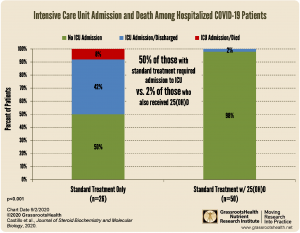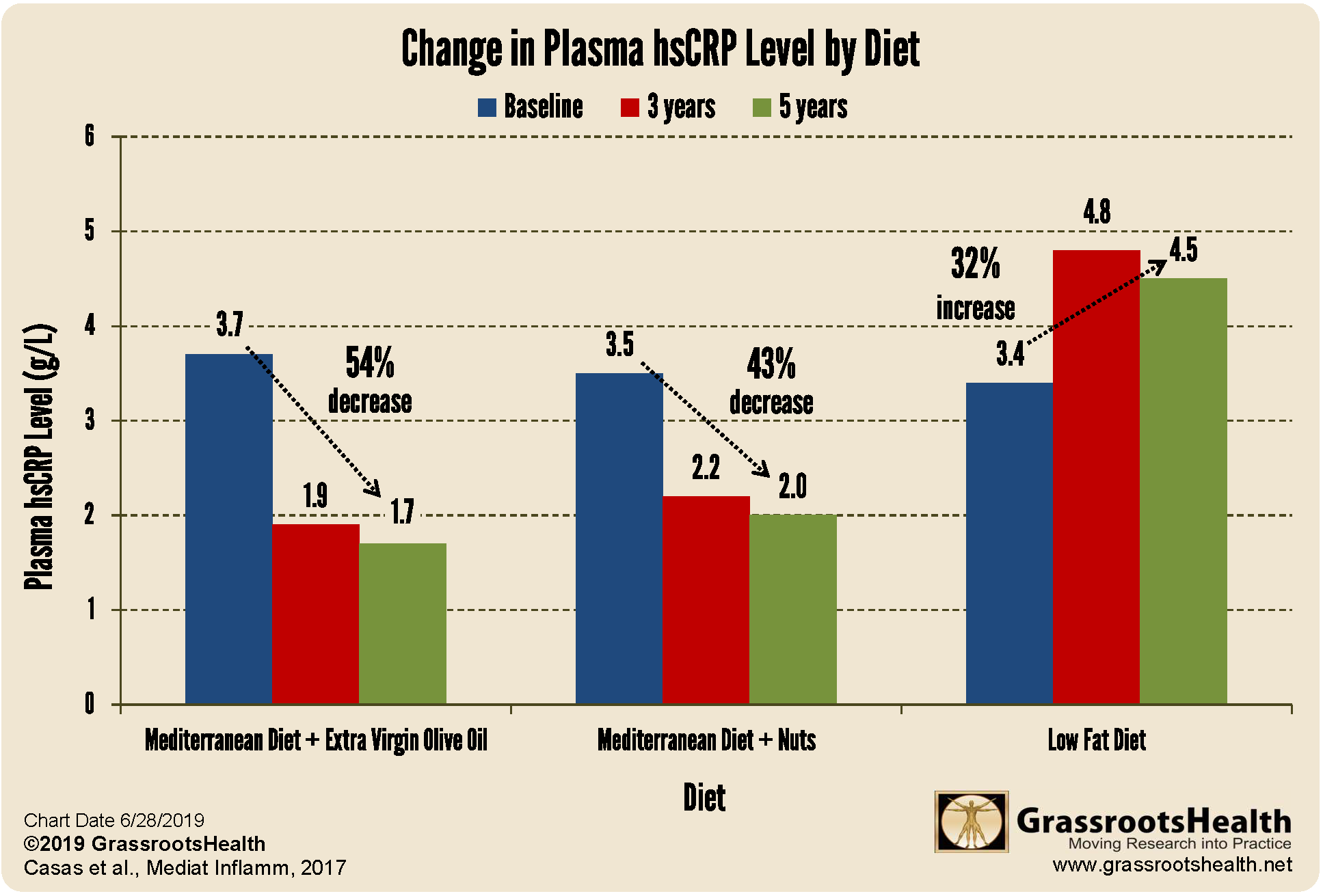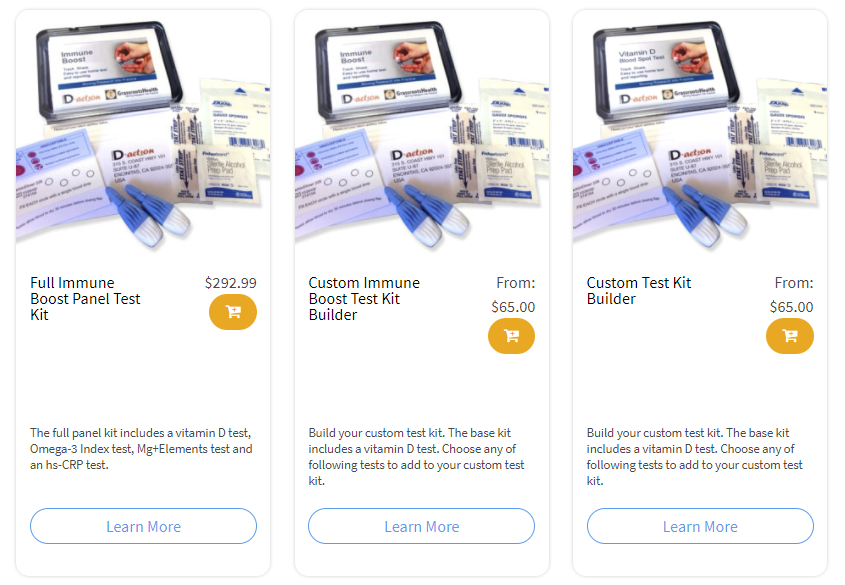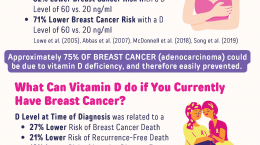Published on October 5, 2020
48 Studies Reviewed to Reveal Dietary Habits, Foods & Nutrients Associated with Breast Cancer Risk
 For anyone concerned with maintaining their health, diet and nutrition may be the easiest and most modifiable lifestyle factor to help achieve specific health goals. Cancer is one health outcome that is directly affected by diet. Just as factors such as obesity and lack of exercise can contribute to an increased risk of cancer, eating certain foods and taking certain nutrients can also either increase or decrease your risk of getting cancer. Eating a healthy diet may be the easiest way to reduce your cancer risk.
For anyone concerned with maintaining their health, diet and nutrition may be the easiest and most modifiable lifestyle factor to help achieve specific health goals. Cancer is one health outcome that is directly affected by diet. Just as factors such as obesity and lack of exercise can contribute to an increased risk of cancer, eating certain foods and taking certain nutrients can also either increase or decrease your risk of getting cancer. Eating a healthy diet may be the easiest way to reduce your cancer risk.
Since it is Breast Cancer Prevention Month, we are bringing you information on actions you can take now to help lower your risk for breast cancer! We previously reviewed how 80% of breast cancer could potentially be prevented just by achieving a vitamin D level of at least 60 ng/ml (150 nmol/L). Below, we summarize findings from a review by Buja et al., which analyzed 48 different studies to assess the association between specific foods and dietary patterns and the risk of breast cancer.
The Mediterranean Diet Demonstrates a Protective Role Against Breast Cancer
Overall, the analysis done by Buja et al. found that diets high in refined sugars, saturated fat, and alcohol (such as the Western Diet) increased breast cancer risk, while the Mediterranean diet, which is high in fish, fiber, healthy fats, vegetables, antioxidants and extra-virgin olive oil, was found to have a protective effect reducing the risk of breast cancer. This protective association was stronger among postmenopausal women, and when alcohol was excluded from the diet. A protective effect was also seen regardless of body weight and BMI among some studies. In other studies, the Mediterranean diet has been shown to lower levels of inflammation in the body, as illustrated in the chart below, which may also contribute to a decreased risk of breast cancer.
Research has established a consistent correlation between diet and inflammation, such as that done by Casas et al. on the Mediterranean diet (MedDiet). This particular study demonstrated the effects of diet on inflammation among 165 participants who had a high risk of cardiovascular disease. The participants were randomly split into three groups and had to follow a specific diet for 5 years: one group was put on a Mediterranean Diet supplemented with olive oil, another on a Mediterranean Diet with nuts (walnuts, almonds, and hazelnuts), and one on a low fat diet. As you can see in the chart above, both groups on the Mediterranean Diet experienced decreased inflammation (as measured by hsCRP), while the low fat diet group did not.
What Specific Foods and Nutrients were Associated with Breast Cancer Risk?
 Besides showing an overall dietary effect on breast cancer risk, the Buja review also revealed specific foods that increase the risk of breast cancer:
Besides showing an overall dietary effect on breast cancer risk, the Buja review also revealed specific foods that increase the risk of breast cancer:
- red or processed meats
- foods with a high glycemic index (such as those high in sugar, starchy carbs, low in fiber, etc.)
- eggs (only significant among women of postmenopausal age)
- alcohol
The following foods and nutrients as part of a healthy diet (low in saturated fat, animal proteins, and refined sugars) were generally found to lower the risk of breast cancer:
- dietary fiber
- vegetables
- soy
- citrus fruit
- mushrooms
- vitamin D
- calcium
- folate
- lignans
- carotenoids
- flavonoids and flavones
One of the Most Important Steps for Breast Cancer Prevention is Reaching a Vitamin D Level of 60 ng/ml!
Many studies have been published showing a decreased risk of breast cancer associated with a higher vitamin D level, including our own, showing an 80% decreased risk for women with a vitamin D level of 60 ng/ml (150 nmol/L) or above! A summary of this research can be found on our Breast Cancer Prevention Study project page.
Stay tuned over the rest of the month of October for more information on vitamin D and other nutrients that may help reduce the risk of breast cancer.
Are Nutrient Deficiencies Hindering Your Immune System?
Could getting more of certain nutrients help to decrease your levels of inflammation and improve your immune response? Find out by testing your vitamin D, omega-3s, magnesium and other essential elements (including copper and zinc), as well as your inflammation levels, with the new Immune Boost home test kit offered by GrassrootsHealth. Measuring levels is the only way to know if you are supporting your immune system and whether additional changes should be made, with supplementation, dietary changes, or both.
Enroll now with the Full Immune Boost Panel (which includes tests for vitamin D, Omega-3 Index, magnesium, zinc, selenium, copper, and hsCRP), and get 10% off when you use coupon code BoostTen at checkout.
What Does it Take YOU to Get Your D to 40 ng/ml (100 nmol/L)?
Did you know your health could be greatly affected by making sure you have a vitamin D level of at least 40 ng/ml (100 nmol/L)? Help us help you.
STEP 1 – Do you know what your vitamin D level is? If not, be sure to test today to find out.
STEP 2 – Determine your target level. Are you at your target level? Experts recommend a level of at least 40-60 ng/ml (100-150 nmol/L).
STEP 3 – Need to boost your level? Use the D*calculator to see how much vitamin D it may take to reach your target. Opt for the Loading Dose for a quicker boost.
STEP 4 – Optimize how your body absorbs and utilizes vitamin D with co-nutrients and these simple steps.
STEP 5 – Re-Test! This is an important step to make sure you have reached your target level, and to ensure you are not taking too much! Re-testing after 3-4 months is recommended.
STEP 6 – Adjust, Repeat…
Give your immune system the nutrients it needs to support a healthy you and protect yourself from unnecessary diseases, especially COVID-19.
NEWS ALERT
 The first Randomized Controlled Trial on vitamin D and COVID-19 has shown a 96% lower risk of ICU admission for those receiving vitamin D (as 25(OH)D to quickly boost vitamin D blood levels) along with the standard treatment, compared to those receiving standard treatment alone.
The first Randomized Controlled Trial on vitamin D and COVID-19 has shown a 96% lower risk of ICU admission for those receiving vitamin D (as 25(OH)D to quickly boost vitamin D blood levels) along with the standard treatment, compared to those receiving standard treatment alone.
These results support many previous observational studies showing a relationship between vitamin D levels and intake and COVID-19 severity.
Review the Latest Nutrient Research for COVID-19
GrassrootsHealth Nutrient Research Institute has launched the new Immune Boost project with the use of our myData-myAnswers nutrient health system that nearly 15,000 people are already using for their health. Specific markers that influence immune health are suggested for testing as part of this project including:
- Vitamin D
- Omega-3 Index
- Essential elements magnesium, selenium, and zinc
- hsCRP
Our goal is to demonstrate how one can use the Nutrient Research Model established by Dr. Robert Heaney to show the effect of vitamin D serum levels of at least 40 ng/ml (100 nmol/L) on risk reduction for all ethnicities in the population. Status and intake of other nutrients will also be analyzed for any type of relationship to immune status and symptom severity. Join the project today!
Please let us know if you’re interested in helping sponsor this project.
Through GrassrootsHealth Nutrient Research Institute, you can also test your essential elements magnesium, copper, zinc and selenium, toxins such as lead, mercury and cadmium, as well as your omega-3 levels, inflammation levels and thyroid stimulating hormone (TSH) level. Find out your levels today! Log on to the test selection page (click the link below) to get your tests and see for yourself if your levels can be improved.
Make sure you track your results before and after, about every 6 months!
Click Here to Access the Test Page
How can I track my nutrient intake and levels over time?
To help you track your supplement use and nutrient levels, GrassrootsHealth has created the Personal Health Nutrient Decision System called
For each specific supplement, you can track what days you take it, how much, and many other details. This will help you know your true supplemental intake and what patterns of use work for you to reach and maintain optimum nutrient levels. Check it out today!










